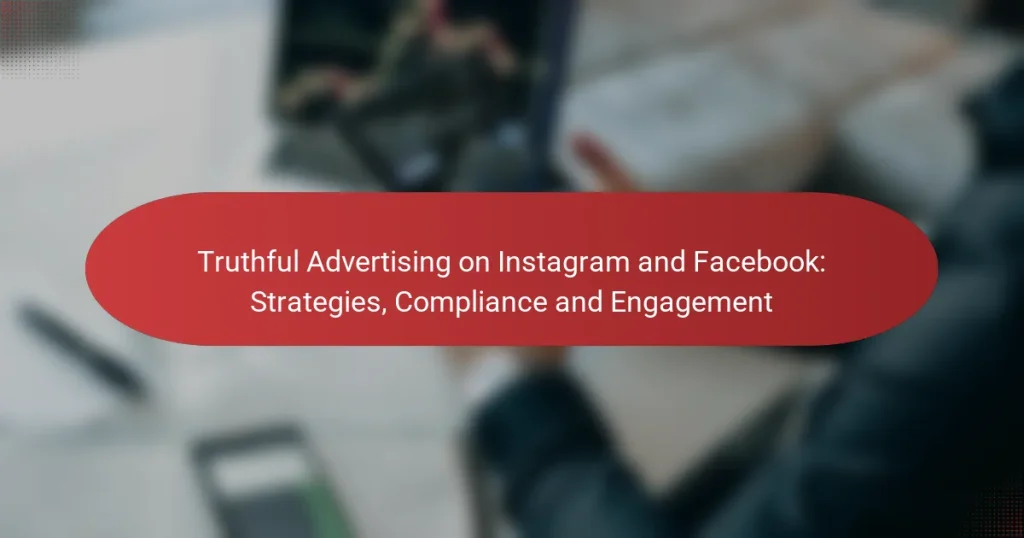The rise of social media has transformed the landscape of advertising, particularly in terms of truthfulness and transparency. As consumers increasingly interact with brands online, the potential for user-generated content to validate or challenge advertising claims has grown significantly. This shift not only holds brands accountable but also emphasizes the importance of adhering to ethical advertising practices to maintain consumer trust and avoid legal repercussions.
User-Generated Content: Trust, Engagement and Authenticity
Social Media Analytics: Insights, Metrics and Honest Advertising
Truthful Advertising on Instagram and Facebook: Strategies, Compliance and Engagement
Misinformation in Social Media Advertising: Challenges, Impact and Solutions
Social Media Platforms: Influence, Authenticity and Truthfulness
Viral Trends: Impact, Authenticity and Advertising Strategies
How does social media influence advertising truth in South Africa?
Social media significantly impacts advertising truth in South Africa by fostering greater transparency and exposing misleading claims. As consumers engage with brands online, user-generated content and reviews can either validate or challenge the authenticity of advertising messages.
Increased transparency through user-generated content
User-generated content, such as reviews and testimonials, enhances transparency in advertising by allowing consumers to share their experiences. In South Africa, platforms like Facebook and Instagram enable users to post feedback, which can influence potential buyers’ perceptions of a product’s truthfulness.
Brands that actively encourage and showcase authentic user content tend to build trust with their audience. For instance, a local skincare brand may highlight customer reviews on their social media pages, demonstrating the effectiveness of their products through real-life experiences.
Challenges of misinformation and fake news
Despite the benefits, social media also presents challenges related to misinformation and fake news that can undermine advertising truth. In South Africa, false claims can spread rapidly, leading to consumer confusion and mistrust. For example, a viral post may falsely claim that a popular beverage contains harmful ingredients, impacting the brand’s reputation.
To combat misinformation, brands should actively monitor social media channels and respond promptly to false claims. Implementing fact-checking measures and promoting accurate information can help maintain credibility and protect consumers from misleading advertising.
What are the implications of false advertising on social media?
False advertising on social media can lead to significant legal, financial, and reputational consequences for brands. Misleading claims can result in lawsuits, regulatory scrutiny, and a loss of consumer confidence, ultimately harming a brand’s long-term viability.
Legal consequences for brands
Brands that engage in false advertising on social media may face legal actions from consumers, competitors, or regulatory bodies. In the United States, the Federal Trade Commission (FTC) enforces truth-in-advertising laws, which require that advertisements be truthful and not misleading. Violations can lead to hefty fines and mandated corrective advertising.
In Europe, the General Data Protection Regulation (GDPR) and various national laws impose strict guidelines on advertising practices. Brands found guilty of misleading advertising could face penalties that range from financial fines to restrictions on their advertising capabilities.
Impact on consumer trust
False advertising can severely damage consumer trust, which is crucial for brand loyalty and repeat business. When consumers discover that a brand has misrepresented its products or services, they are likely to share their negative experiences online, further eroding trust among potential customers.
Research indicates that a significant percentage of consumers are less likely to purchase from brands that have been caught misleading them. Brands must prioritize transparency and honesty in their advertising to maintain and rebuild trust with their audience.
How can brands ensure truthfulness in social media advertising?
Brands can ensure truthfulness in social media advertising by adhering to strict guidelines and utilizing reliable fact-checking services. These practices help maintain transparency and build consumer trust, which is essential in today’s digital landscape.
Implementing strict advertising guidelines
Establishing clear advertising guidelines is crucial for brands to promote honesty in their social media campaigns. These guidelines should outline acceptable practices, including accurate representation of products and services, disclosure of sponsorships, and avoidance of misleading claims.
Brands can create a checklist to ensure compliance with these guidelines, such as verifying all claims before posting, using clear language, and including disclaimers where necessary. Regular training for marketing teams on these standards can further reinforce the importance of truthfulness.
Utilizing fact-checking services
Incorporating fact-checking services into the advertising process can significantly enhance the credibility of social media content. Brands can partner with third-party fact-checkers to review claims and provide validation before content goes live.
Using fact-checking tools not only helps prevent the spread of misinformation but also demonstrates a brand’s commitment to integrity. Brands should consider setting up a routine for fact-checking, especially for high-stakes campaigns, to ensure all information shared is accurate and trustworthy.
What are the best practices for ethical advertising on social media?
Best practices for ethical advertising on social media include transparency, authenticity, and respect for audience engagement. Advertisers should prioritize honesty in their messaging and ensure that their promotions align with the values of their target audience.
Engaging with audiences authentically
Authentic engagement means interacting with your audience in a genuine manner, rather than using scripted or overly polished messages. This can involve responding to comments, asking for feedback, and sharing user-generated content. Building a community around your brand fosters trust and loyalty.
To engage authentically, consider using informal language and relatable visuals that resonate with your audience. Regularly posting behind-the-scenes content or personal stories can also enhance relatability and strengthen connections.
Disclosing partnerships and sponsorships
Transparency regarding partnerships and sponsorships is crucial for maintaining trust with your audience. When promoting products or services for which you receive compensation, clearly disclose this relationship. Use terms like “ad,” “sponsored,” or “partnership” to inform your audience.
Following guidelines set by regulatory bodies, such as the Federal Trade Commission (FTC) in the U.S., is essential. Non-compliance can lead to penalties and damage your brand’s reputation. Always prioritize clarity to ensure your audience understands the nature of your promotions.
What role do regulatory bodies play in advertising truth?
Regulatory bodies are essential in ensuring advertising truth by establishing and enforcing standards that prevent misleading claims. They oversee compliance with these standards, particularly in traditional and digital advertising, including social media platforms.
Enforcement of advertising standards
Regulatory bodies, such as the Federal Trade Commission (FTC) in the United States or the Advertising Standards Authority (ASA) in the UK, set guidelines that dictate what constitutes truthful advertising. These standards require that advertisements must not be deceptive or misleading, and they must be substantiated by evidence.
Enforcement actions can include fines, mandatory corrections, or even bans on certain advertising practices. Companies must be vigilant in ensuring their marketing materials comply with these standards to avoid penalties and maintain consumer trust.
Monitoring social media campaigns
Regulatory bodies actively monitor social media campaigns to ensure compliance with advertising truth standards. They scrutinize influencer partnerships, sponsored content, and user-generated content to identify potential misleading claims or lack of proper disclosures.
Brands should implement clear guidelines for their social media marketing strategies, including the use of hashtags like #ad or #sponsored to denote paid promotions. Regular audits of social media content can help ensure adherence to advertising regulations and avoid negative repercussions.
How can consumers identify truthful advertising on social media?
Consumers can identify truthful advertising on social media by critically evaluating the source and understanding the disclosures associated with advertisements. This involves recognizing credible sources and being aware of the regulations that govern advertising practices.
Recognizing credible sources
To determine if an advertisement is truthful, start by assessing the credibility of the source. Look for well-known brands or influencers with a history of transparency and integrity. Check for verified accounts, which often indicate authenticity.
Additionally, consider the context of the advertisement. If it appears on a reputable platform or is shared by trusted individuals, it is more likely to be reliable. Always cross-reference information with other reputable sources to confirm its validity.
Understanding advertising disclosures
Advertising disclosures are essential for identifying truthful advertising. In many countries, regulations require that sponsored content be clearly labeled as such. Look for terms like “ad,” “sponsored,” or “paid partnership” to distinguish between organic content and advertisements.
Familiarize yourself with the specific regulations in your region, as they can vary. For instance, in the United States, the Federal Trade Commission (FTC) mandates clear disclosures to prevent misleading advertising. Being aware of these standards can help you make informed decisions about the advertisements you encounter on social media.
What are the emerging trends in social media advertising ethics?
Emerging trends in social media advertising ethics focus on transparency, authenticity, and accountability. Advertisers are increasingly expected to provide clear information about their practices and the content they promote, ensuring that consumers can make informed decisions.
Rise of AI in content creation
The rise of AI in content creation is transforming how brands engage with consumers. AI tools can generate personalized advertisements at scale, but they also raise ethical concerns regarding authenticity and manipulation. Advertisers must ensure that AI-generated content is clearly labeled and does not mislead consumers.
Brands should consider implementing guidelines for AI use, such as transparency about AI involvement in content creation. This can help maintain trust with audiences and comply with emerging regulations on digital advertising.
Increased focus on sustainability and social responsibility
There is a growing emphasis on sustainability and social responsibility in social media advertising. Consumers are increasingly drawn to brands that demonstrate commitment to ethical practices, such as eco-friendly products and fair labor practices. Advertisers need to align their messaging with genuine efforts in these areas to avoid accusations of greenwashing.
To effectively communicate their sustainability initiatives, brands should provide clear, verifiable information about their practices. This includes sharing data on resource usage, waste reduction, and community impact, which can enhance credibility and foster consumer loyalty.






